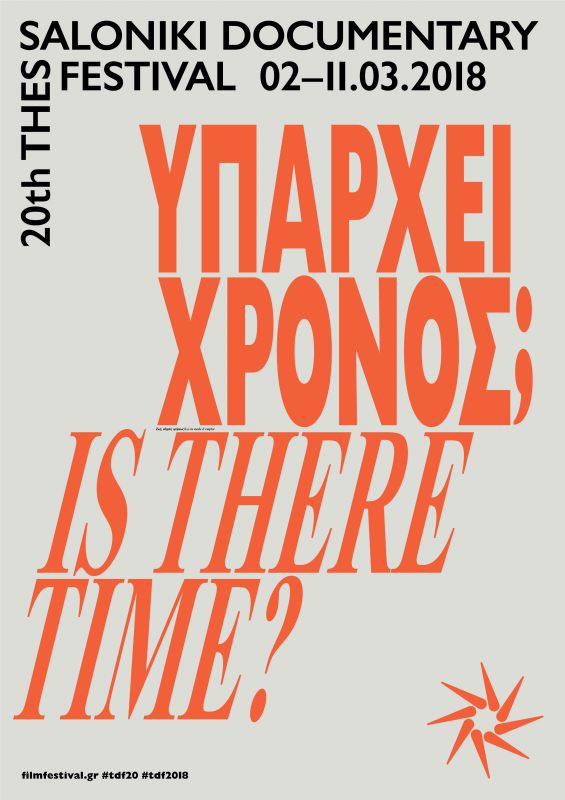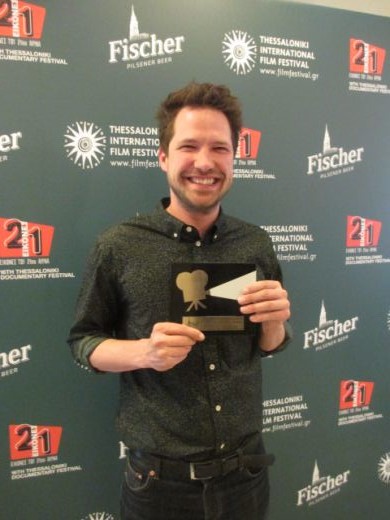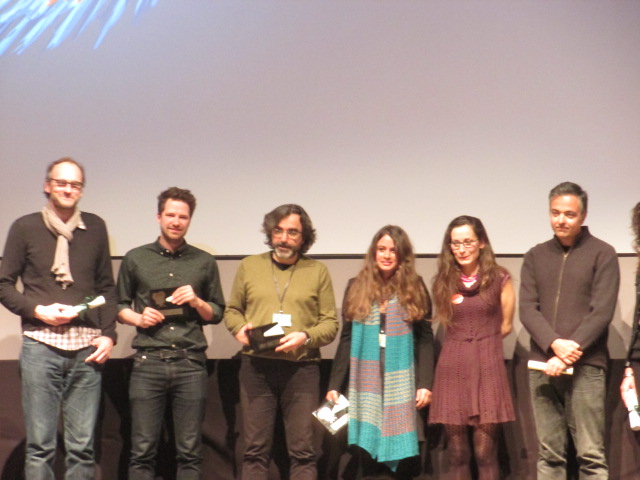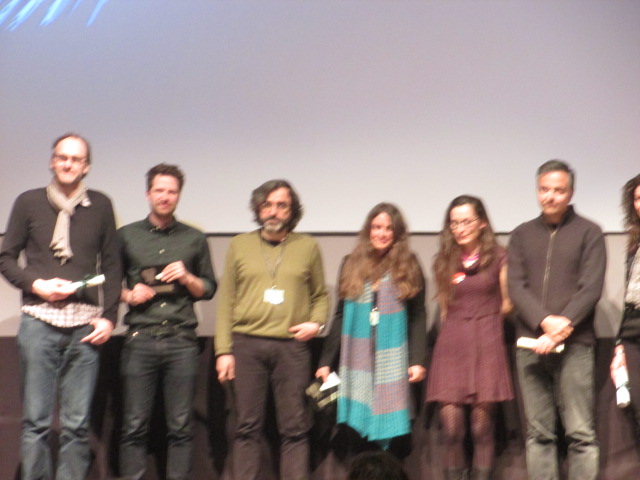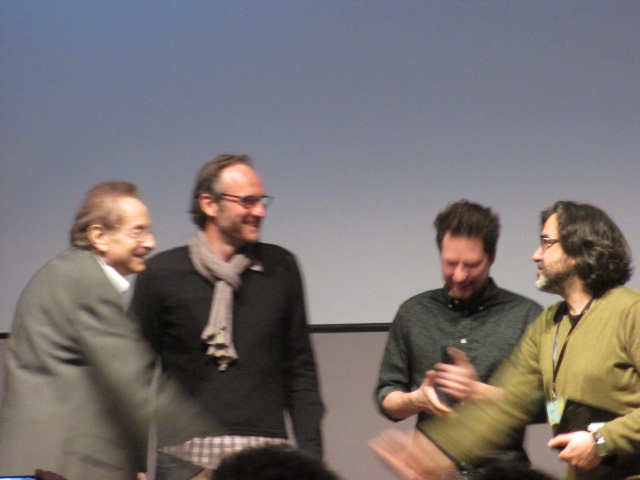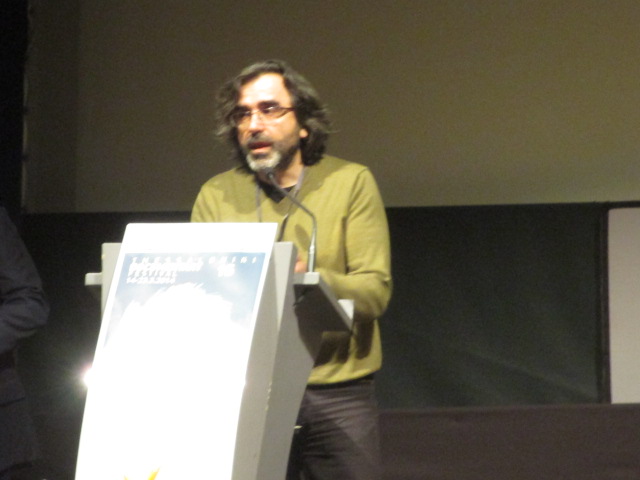|
|
||
|
Pro Tools
FILMFESTIVALS | 24/7 world wide coverageWelcome ! Enjoy the best of both worlds: Film & Festival News, exploring the best of the film festivals community. Launched in 1995, relentlessly connecting films to festivals, documenting and promoting festivals worldwide. Working on an upgrade soon. For collaboration, editorial contributions, or publicity, please send us an email here. User login |
'Just Talking' at 14th TDF-14th TDF PRESS- JUST TALKING The Just Talking section of the 14th Thessaloniki Documentary Festival opened on Sunday, March 11, 2012. Participating were the directors Natalie Johanna Halla (Gaelle), Steve Lickteig (Open Secret), Ira Dika (Stavroula) and screenwriter/producer Noemi Weis (Desert Riders), whose films are included in this year’s International Program. The session began with a discussion about the bonds that develop between the director and the project’s main character, whether and to what degree they themselves are emotionally affected. “I get attached to my characters, and I suffer with them”, admitted Noemi Weis. Desert Riders focuses on children who are trafficking victims so that they work as jockeys in Middle Eastern camel racing, while they suffer systematic abuse. “They shot them with hormones so they wouldn’t grow. 15-year-olds looked 7 years old. It was heartbreaking to see. It was very difficult to remain objective, because in order to earn their trust you had to get very close to them. You feel responsible for their suffering when they tell you what they’ve lived through, but in the end there is a therapeutic side to all this. If even one of your characters ends up feeling this way, it is a great victory”, Ms Weis stressed. Speaking about the film’s production conditions, she explained that they were extremely difficult. In the United Arab Emirates she had to go through an interrogation and explain what she is doing in the country and what the purpose of the film is. "I come from Argentina and this reminded me of the days of dictatorship in my country," commented Mrs. Weis. For Steve Lickteig "all films are a process of self-discovery and therapy, since by the end of the process you go to another level." In his documentary Open Secret, the element of self-discovery is more powerful, as the film tells his personal story. At the age of 18 he discovered that his adoptive parents were in fact his grandparents, and his older sister was actually his biological mother. Everyone around him knew this secret – friends and acquaintances – except for him. As a radio journalist, Steve Lickteig dealt with the story like a reporter. “It was like having interviews with strangers, I pretended to know nothing and really, I didn’t. They asked me why I didn’t include more emotion, more tears in the film. But I’m not like that, so the film would not have been authentic. In my film, feelings simmer under the surface”, the director noted. He added: “I didn’t accuse any of my relatives; I just asked them about their lives respectfully and honestly. I think my film was a gift: I gave them the opportunity to tell their truth without feeling that I’m judging them, that they have to apologize”. In her turn, Natalie Johanna Halla noted: “I don’t know if my films ‘choose’ to be emotional; my viewers always tell me they cry at my films”. Her documentary Gaelle tells a moving story about a team of Spanish rescue workers who participated in a rescue mission in Haiti, after the earthquake. “I give my characters the opportunity to speak about their feelings and I believe that feelings are more important than the film’s subject. It is very important for me to respect the feelings of the participants, keeping the camera at a distance, so that I don’t disturb the rescue process. Personally however, this experience made me stronger because what I recorded was very powerful”, Ms Halla stressed. Ira Dika’s documentary Stavroula is included in the Portraits: Human Journeys section of the 14th TDF. The film looks at the life of an elderly woman, highlighting those moments that cause the viewer to reflect on the relationship of ageing, time and memory. “I knew Stavroula before I made the film because of her close relationship with my mother. I truly enjoyed making the film, and while reviewing the material during editing, I discovered more things about this woman”, the director said. She added: “Stavroula is an elderly lady who resembles a child in many ways. My aim was to use her story in order to speak about life itself, what it is like to lose the memories of the life you’ve led and how you look at other people who are ageing”. The subject of limits and the moral obligation of the director to his subject always come up in the process of filming a human story. Noemi Weis “sacrificed” scenes in order to protect her characters. “The children spoke quite openly, but we decided not to bring up the subject of sexual abuse. We didn’t want to deal with such details, not because it was a taboo subject, but because there isn’t any reason to pile on the drama and the tears, the audience understands. Once I made a film about family violence, but we didn’t show the women with bruises, we showed them as beautiful, because they had the strength to tell their stories to the camera. When a film’s financiers want drama, we have to know where to set the limits and to what extent we can allow the story to unfold by itself and lead the viewer on”, Ms Weis noted. Steve Lickteig faced the dilemma of moral limits since he filmed members of his own family. “You feel that in reality you’re exploiting their stories. At one point my biological mother told my adoptive mother things she didn’t want heard. I decided to use them, not just to add drama. It was good for the film to include that particular dialogue, because it demonstrated the change in the story”, the director noted. For her part, Ira Dika wondered if she should show the scenes where Stavroula was naked in the bath. “In the end, I had to because this wasn’t a film about Stavroula but about all elderly people”, the director said. Another crucial issue for directors is financing. “Every film is a miracle. When asked, I say I produce dreams! You never really know where financing will end up coming from”, Noemi Weis said. She told a personal story: “A friend of mine made a film about religion, and I went to the shoot which took place in a church. I started talking with a gentleman, who ended up being the priest. I told him about the film I was making and 10 days later I received a note saying that he was very moved and that included a check with $1000 he had raised from his congregation”. Steve Lickteig used different sources of financing, from his credit card to crowd funding. He found money through the www.kickstarter.com site, and he also had important help from the director of the Rosenthal Institute. “That woman was like my guardian angel, she showed up at the right place in the right time”, the director said of the Institute head. For Natalie Johanna Halla “financing was not an issue”, since her first film was made with a minimal budget and the second was also low budget, even though it had two co-producers. Ira Dika’s first student film Stavroula, had almost no budget at all. “I don’t know anything about the difficulties of financing since there was no such issue right from the beginning”, the director noted. The discussion also focused on the fact that film festivals are a welcoming communication channel with the audience for directors. “Festivals provide an amazing opportunity to come in contact with an audience that loves documentary films, to make your voice stronger, showing what you do. A ‘yes’ from a festival can change your life”, Noemi Weis said. “Festivals have a very positive function; they provide me with the audience’s reaction and the strength to go on. And getting that one ‘yes’ is worth ten ‘no’s”, added Natalie Johanna Halla. “What I like about the Thessaloniki Documentary Festival is the respect you show directors. I can see that it would be worth the trouble making a second film” Steve Lickteig commented. “We wanted to be proud of the film we would be presenting at the Thessaloniki Documentary Festival, because it is the most important such institution in the country”, Ira Dika declared. -14th TDF PRESS-
16.03.2012 | Thessaloniki's blog Cat. : 'Just Talking' at 14th TDF Argentina Contact Details Director Entertainment Entertainment Haiti Ira Dika (Stavroula) Journalist Natalie Johanna Halla (Gaelle) Natural Disaster Noemi Weis Person Career Politics Politics priest Quotation Reporter Rosenthal Institute screenwriter /producer Steve Lickteig The 14th Thessaloniki Documentary Festival the Thessaloniki Documentary Festival United Arab Emirates www.kickstarter.com News
|
LinksThe Bulletin Board > The Bulletin Board Blog Following News Interview with IFTA Chairman (AFM)
Interview with Cannes Marche du Film Director
Filmfestivals.com dailies live coverage from > Live from India
Useful links for the indies: > Big files transfer
+ SUBSCRIBE to the weekly Newsletter Deals+ Special offers and discounts from filmfestivals.com Selected fun offers
> Bonus Casino
User imagesAbout Thessaloniki Mcmahon Vanessa Mcmahon Vanessa Vanessa McMahon Covered the 13th and 14th, and 16th edition. Through its tributes, it focuses both on discovering filmmakers with a unique cinematic point of view, and on the internationally recognized for their contribution to documentary. Contributions from Buno Chatelin http://tdf.filmfestival.gr/default.aspx?lang=en-US&loc=6&page=760 View my profile Send me a message My festivalThe EditorUser contributions |



















